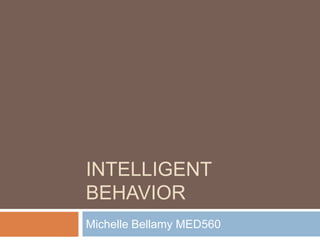
Intelligent behavior med 560
- 2. Characteristics Problem Solving Creativity Self Control Empathy Abstract thinking
- 3. Problem Solving Problem solving can include anything from math or word problems to coming up with innovative ideas. This can be supported in the classroom by asking students more open ended questions and allowing them to use their imaginations.
- 4. Creativity A creative student is one who comes up with unique ideas or a unique spin on a project. Creativity can be achieved by loosening the reigns on assignments and giving students more flexibility and freedom in their assignments, such as allowing them to create videos or act out scenes from plays.
- 5. Self Control Students with self control don’t lash out in anger or frustration. They raise their hand to be called on. This can be supported in the classroom by setting boundaries, explaining there are consequences for inappropriate behavior, and following through with consequences.
- 6. Empathy A student with empathy has the emotional maturity to recognize the struggles of others. They better understand things like diversity and the struggles that can come with it. This can be supported in the classroom by teaching students to be culturally aware and competent.
- 7. Abstract Thinking A student who can thinking abstractly is able to understand concepts and their implications. They can delve deep into a problem and find an original way to solve it. This is supported in the classroom through open ended questions and assignments that prompt students to think outside the box.